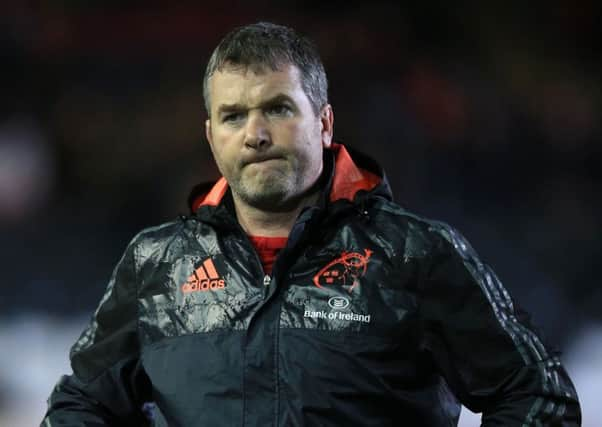Obituary: Anthony Foley, Ireland rugby internationalist and club legend at Munster


Anthony Foley was destined to play for Ireland and become one of the great figures of Munster rugby.
Foley’s father Brendan – a member of the Munster team that beat the All Blacks in 1978 – was a lock forward who won 11 caps for Ireland and rugby was in the family blood.
Advertisement
Hide AdAdvertisement
Hide AdSister Rosie played rugby, but it was Anthony who became the best known of the Foley clan after swapping hurling for the oval ball as a child.
Born on 30 October, 1973 and educated at St Munchin’s College in Limerick, Foley played for Shannon his entire career and his progression was swift.
Just a few months past his 21st birthday, he made his Ireland debut against England in the 1995 Five Nations Championship
Foley made a try-scoring start in a 20-8 Lansdowne Road defeat and would be selected for Ireland’s World Cup squad in South Africa that summer.
His Munster bow came the following November in the Irish province’s first ever Heineken Cup fixture against Swansea.
It was a fitting debut as he became a giant of Munster rugby in an era when they were often among the best in European rugby.
A rugged competitor who epitomised the physical brand of Irish rugby shown by the likes of Paul O’Connell and Peter Clohessy, Foley won the first five of his 62 Ireland caps – three of which came as captain in 2001 and 2002 – as a flanker. But he was a natural number eight and it was a position he was to hold in the Ireland back row for almost a decade after starting there against Australia in November 1996.
Foley missed the 1999 World Cup and played in the 2003 edition, and his last Ireland appearance came in March 2005.
Advertisement
Hide AdAdvertisement
Hide AdBut he probably became associated with Munster as much as Ireland with the province establishing itself as a real European force.
“He epitomises what Munster rugby is all about,” said former Ireland player Donal Lenihan, the manager of the 2001 British and Irish Lions tour to Australia.
Foley played in the Munster teams edged out in the 2000 and 2002 Heineken Cup finals by Northampton and Leicester. But Munster finally won the greatest prize in European club rugby when Foley led them to victory over Biarritz in 2006.
Foley missed out on the province’s second Heineken Cup success in 2008, and announced his retirement at the end of that season after collecting a record 201 Munster caps.
But he later took up a coaching role with Munster, serving as a defensive specialist, and also worked with the Ireland Wolfhounds in 2011.
Later that year he was named as successor to Australian Laurie Fisher in the Munster forwards job.
In 2014 he became the first Munster manager of the professional era to hail from Limerick.
“The last time something like this happened would have been when I got capped for Ireland first,” Foley told the Limerick Leader about the huge number of messages of support following his appointment.
Advertisement
Hide AdAdvertisement
Hide Ad“You get a bit taken aback by the amount of goodwill and the good wishes out there.”
Munster were in a rebuilding phase under Foley’s command and failed to hit the heights in Europe they had during his own playing days.
But Munster were PRO12 finalists in his first season in charge in 2014-15, with Glasgow the eventual champions.
It is undeniable that the whole of Ireland will mourn one of the country’s most popular rugby figures.
But it is in Limerick and throughout the province of Munster where Foley’s loss will be the most sharply felt.
Foley is survived by his wife Olive and two sons Tony and Dan.